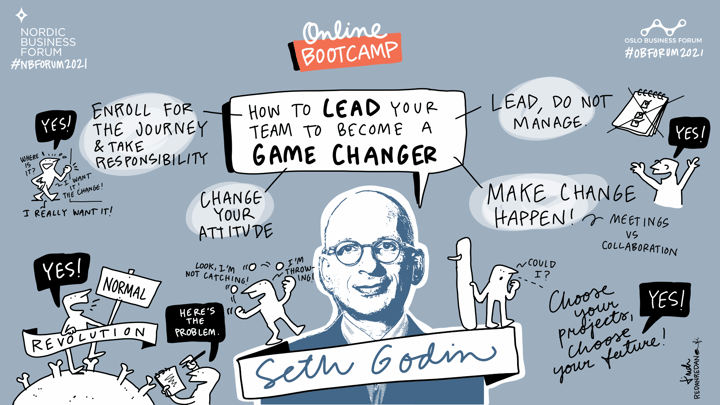“Choose to decide that you want to change the game.”
Seth Godin is an entrepreneur, bestselling author, and speaker. He writes one of the most popular blogs in the world, and has published 19 best-selling books, including This is Marketing, and in 2018, he was inducted into the Marketing Hall of Fame. Seth's teaching focuses on everything from effective marketing to leadership to the spread of ideas, and his speaking has motivated and inspired leaders around the world.
At the Online Bootcamp, Seth challenged participants to choose their future and lead their teams to become game-changers.
.jpg?width=720&name=MaxEmanuelson__MAX6943%20(1).jpg)
A Chance to Change the Game
The way we live, work, and engage in the world today has been turned upside down. Seth Godin believes we're in the midst of a revolution, one that has destroyed the perfect and enabled the impossible.
A year or two ago, we lived in a perfect world, one we considered "normal." It was not unlike the "normal" embraced by Western Union when messages were sent via telegram. Alexander Graham Bell disrupted Western Union's notion of normal when he invented the telephone, and that disruption presented Western Union with a chance to change the game.
Today, Seth highlighted, we also have a chance to change the game. "Normal," as we knew it, no longer exists. Disruption is all around us, and everywhere we look, organizations are doing what we once thought was impossible. They're choosing their future and changing the game.
As leaders, we must ask ourselves: Are we interested in being game-changers, or are we going to allow someone else to do it and then struggle to keep up?
Are You Ready to Change the Game?
As leaders, we all want to change the game… or at least that's what we say. Sometimes, an aversion to risk or fear of failure holds us back from being game-changers and enabling our teams to do the same.
The first step in changing the game is adjusting our attitudes and accepting or rejecting our responsibility to make a change. Seth recommended an exercise to help leaders identify their readiness: the problem-solution card.
On one side of the card, write down a problem you've been wrestling with. Then hand your card to a stranger and ask them to write a solution on the other side. When they give it back to you, look at what they've written and ask yourself, "Am I willing to do this?"
If your answer is "no," then you might not have a problem at all. Instead, you might just have acceptance that things aren't quite right. If your answer is "yes," then you're ready to change the game. You've accepted responsibility and enrolled in the journey.
“Leadership is this idea of finding problems and solving them. And one of the definitions of a problem is that it’s solvable. If it’s not solvable, it’s not a problem—it’s a reality.”
Enroll Your Team in the Journey
The idea of enrollment is critical for leaders. When you choose to enroll, you're making a choice between management and leadership.
We live in a world that has been built on management. Seth contended that management is using authority to tell people what to do. Management is making everything a little bit better, a little bit faster, and a little bit cheaper in a predictable, reliable way. The world needs managers—but it needs more leaders.
And, “management is not the same as leadership”. Leaders sign up to change the game. They explore the edges, find problems, and uncover solutions. Leaders make change happen, and they invite others to enroll with them on the journey.
The truth is, it is a leader's job to make a change. This is a responsibility you can either accept or reject. Accept it, and your team and your organization will be better prepared to thrive in the future. Reject it and risk being left behind.
How to Change the Game
For those leaders who enroll in the journey and are ready to help their teams change the game, Seth offered several lessons.
- Take responsibility. You might say, "I'd love to change, but my boss won't let me." Sometimes, this is an honest admission of our fear of change. And sometimes, this indicates a need to distinguish between responsibility and authority.
In most organizations, Seth explained, authority is hard to come by. We don't all find ourselves in a role that offers unbridled decision-making. Responsibility, on the other hand, is given out like candy. We can all choose to take responsibility for changing the game. “If you’re willing to take responsibility and give away credit, you can do almost anything you want.”
In an environment where game-changers don't believe they have the permission—or the authority—to enact change, the secret is to do small things. If those small things fail, take responsibility. And if those small things succeed, give away credit. Seth urged leaders to be eager to admit when they are wrong and give credit when they are right. - Be willing to take risks. The willingness to take risks is often another key difference between management and leadership. When we manage, we feel certainty in the day-to-day and perhaps even accept the mundane. When we lead, we embrace the unknown, and as we approach each challenge, we're comfortable saying to our teams, "this might not work."
When you play a game, sometimes you win, and sometimes you lose. And that's ok. Embracing your responsibility as a game-changer doesn't mean you're always going to be right; it means that even when you're wrong, you can still play again tomorrow. Seth challenged leaders to take a risk today, and if it doesn't work, step up to bat again tomorrow. - Recognize that change is incremental. Most game-changing action isn't accomplished in a single big move. Instead, it happens with a series of many small steps. Seth believes there are many small steps we can take, experiments we can encourage our teams to perform, to uncover what works and what doesn't. The key is to commit to the process, constantly urging forward motion.
Gradual changes and shifts in our culture will lead to the long-term transformation we want to see in our business. Seth encouraged leaders to change one mind and then another. With your team, run a pilot or a test. In time, the way you're changing the game will be apparent.
Choose Your Future
In our organizations, many of us are already planning for the future, and it probably looks a lot like our past. But it doesn't have to.
Seth reminds us that, as leaders, we are in a unique and privileged position to choose our future by choosing to change the game. Decide to accept responsibility, take risks, and make small steps. Decide to play the game and remember that if you fail, you can play again tomorrow. “This moment is a time to do work that matters for people who care.”

Key Points
- As leaders, it's our job to make a change, and it is a responsibility we can either accept or reject. Accept it, and you choose your future.
- In an environment where game-changers don't believe they have permission to change, the secret is to do small things.
- Being a game changer doesn't mean you're always going to be right; it means that even when you're wrong, you can still play again tomorrow.
- The gradual changes and shifts in our culture lead to the long-term transformation we want to see in our business.
- As leaders, we are in a unique and privileged position to choose our future by choosing to change the game.
Questions to Consider
- Do you accept your responsibility as a leader and a game-changer?
- Are you comfortable taking a risk and saying, "this might not work?"
- What are the small steps you can take to begin changing the game in your business?
